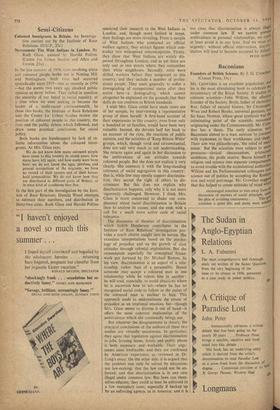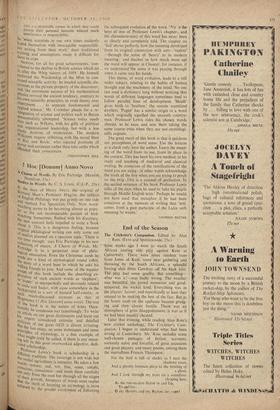Baconians
Founders of British Science. By J. G. Crowther' (Cresset Press, 35s.) MR. CROWTHER is an excellent populariser, and his is the most stimulating book to celebrate the tercentenary of the Royal Society. It studies eminent scientists—John Wilkins, the effective founder of the Society, Boyle, father of chemistrYi Ray, father of natural history, Sir Christopher, Wren and Robert Hooke, universal geniuses. a° Sir Isaac Newton, whose great synthesis was the culminating point of the scientific movement originating under the Commonwealth. Mr. Croy'', ther has a thesis. The early scientists were Baconians almost to a man, anxious 'to converse, with tradesmen in their workhouses and shops, Their aim was philanthropic, 'the relief of mans estate.' But the scientists were subject to social pressures—clerical obscurantism, aristocratic, snobbism, the profit motive. Bacon himself Pla religion and science into separate compartments' to avoid trouble with the ecclesiastical authorities Wilkins and his Parliamentarian colleagues tool; science out of politics by accepting the Rest°, tion and royal patronage. Mr. Crowther sugge,1 that this helped to create attitudes of mind whle . . . encouraged scientists to turn away from thee discussion of matters of social principle. luld
the plea of avoiding controversy. . • . Thisni scientists a quiet life, and many were satisfi t■Ith a c.untortable corner in which they could pursue their personal interests without much interrerencc or responsibility.
So 'When scientists in our own times suddenly found themselves with inescapable responsibili- ties arising from their work,' their traditional training and assumptions made it difficult for them to cope. •
Newton, for all his great achievements, 'con- tributed to the decline in British science which set in after the Whig victory of 1689.' He himself preferred the Wardenship of the Mint to con- tinued scientific activity; he treated scientific dis- coveries as the private property of the discoverer; and the enormous success of his mathematical r'Ysies revived the ancient tendency, contrary to s Own scientific principles, to exalt theory over experiment . . . to separate fundamental and Pl3lied science.' Mr. Crowther pleads for a re- integration of science and politics such as Bacon unsuccessfully attempted 'Science today needs Men such as Wilkins, with his gifts of political and organisational leadership, but with a less Vvastie doctrine of moderation. The modern ilkinses require stiffening,with the moral fibre et Ray and Boyle,' who rejected positions of power and eminence rather than take oaths which niknded their consciences.
CHRISTOPHER HILL







































 Previous page
Previous page